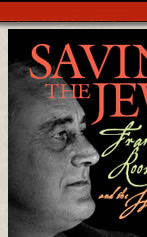

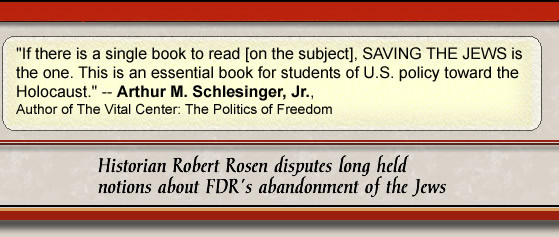
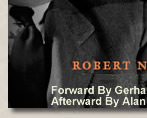

|
Reviews |
|
|
|
|
|
|
Why I Wrote The Book |
|
|
Excerpts |
|
|
Table Of Contents |
|
|
Auschwitz |
|
|
SS St. Louis |
|
|
Timeline |
|
|
A Survivor Speaks Out |
|
|
Carter Center Speech |
|
|
Justice At Nuremberg |
|
|
Purchase |
|
|
Related Links |
"The Jews have three velten [“worlds” in
Yiddish]:
die velt [this world], yene velt [the
next world], and Roosevelt."
-Congressman Jonah J. Goldstein
"Know ye not that there is a prince and a great man fallen this day in Israel."
-Rabbi G. George Fox’s eulogy of Franklin Roosevelt,
April 1945.
In April 2001 I visited my daughter Ali, then a fifteen-year-old student at Phillips Academy in Andover, near Boston. We went to the Holocaust Memorial near Quincy Market in downtown Boston, and I was taken aback by a seemingly innocuous but in fact outrageous statement engraved in stone: “By late 1942, the United States and its Allies were aware of the death camps but did nothing to destroy them.” I knew that in 1942 the Allies lacked the ability to destroy the Nazi death camps. Over lunch, this Jewish American father explained to his Jewish American daughter that the United States was not even a belligerent in World War II until the attack on Pearl Harbor on December 7, 1941, and that our armed forces and citizens, I believed, were woefully unprepared for war at that moment.
I told Ali that in 1942, President Roosevelt began fighting what, for Americans, appeared to be a desperate multi-front war against brutal Japanese militarists in the Pacific and a triumphant Nazi Germany and Fascist Italy in Europe and North Africa. We strove mightily, I explained, to save Great Britain, the Soviet Union, and all of Europe from the German juggernaut.
“But why didn’t we try to save the Jews?” Ali asked.
“FDR did the best he could,” I told her.
But was I right?
It certainly did not appear so when I began my research. In fact it appeared I was badly mistaken. Annie, my oldest daughter, and Will, my son, wanted to know why it mattered, but they patiently listened or pretended to listen to my arguments and stories.
How did it happen, I wondered after reading the literature on the subject, that Franklin Delano Roosevelt, the man who detested the Nazi regime, who was key to the destruction of Nazism and Adolf Hitler, and who earned the support of more than 90 percent of American Jews when he ran for president, now stood in the dock of history, accused of the willful failure to rescue European Jewry from the Holocaust and of being antisemitic? My own generation of rabbis, journalists, and historians regularly implied or directly accused Roosevelt of being an antisemite. Even the respected historian Paul Johnson, author of Modern Times (1991) and A History of the Jews (1987), described Roosevelt as being “anti-Semitic, in a mild way.”
The verdict of history appeared to be worse than I could have imagined. Journalists, film-makers, Holocaust experts, and historians had produced a body of work that not only condemned Roosevelt, the United States government, and American Jewry for their failure to save the Jews of Europe, but also accused them of being accomplices of the Nazis in their most horrific war crimes. These critics claimed that Roosevelt “abandoned the Jews” of Europe (David Wyman); that he was a coward who was guilty of “indifference and even complicity in the Final Solution” (Henry I. Feingold); his “policies endangered European Jews” (Rafael Medoff); that he “enabled the Nazi Germans . . . to slaughter six million Jewish men, women and children” (Herbert Druks); and was an accomplice “to history’s most monstrous crime” (Monty Penkower). The Allies “played a major role in the whole extermination process” according to Gerhart M. Riegner. Saul Friedman declared that a “yoke of shame” hung over the United States for its failure to rescue the Jews of Europe.
To be consistent, these authors also blamed Roosevelt’s loyal supporters, American Jewry, for not coming to the aid of their brethren in Europe. Rabbi Stephen S. Wise failed to convince FDR to act, they said.
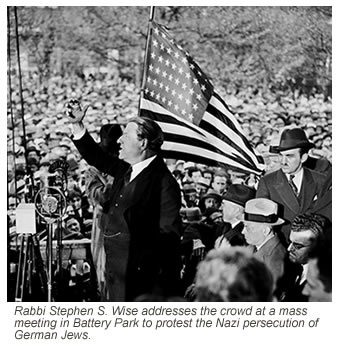 American Jewish congressmen and organizations all failed
to save the Jews of Europe. “The American Jew,” Rabbi Haskel Lookstein
opined, “could not stand up proudly . . . his natural posture was
bowed and bent.” American Jewish GIs who fought and died on the
battlefields of France and Germany made no appearance in these works.
American Jewish congressmen and organizations all failed
to save the Jews of Europe. “The American Jew,” Rabbi Haskel Lookstein
opined, “could not stand up proudly . . . his natural posture was
bowed and bent.” American Jewish GIs who fought and died on the
battlefields of France and Germany made no appearance in these works.
My research in the archives and the history of the times led me to a far different conclusion. After years of study and the discovery of documentary evidence other historians had not cited, I concluded that Roosevelt did not abandon the Jews of Europe. On the contrary, he led the worl-dwide coalition against Nazism in a war that took fifty million lives. He marshaled American opinion against antisemitism at home and Nazism abroad. He did not ignore the passengers on the SS St. Louis, an episode much trumpeted against him. Indeed, his close Jewish friends, including Henry Morgenthau, saved all the passengers on the St. Louis. He spoke out about the Holocaust. He denounced the Nazi massacres of Jews in July 1942. He warned Germans of “fearful retribution” in August of that year. On December 17, 1942, Roosevelt and Churchill issued the United Nations Declaration on Jewish Massacres, denouncing “in the strongest possible terms this bestial policy of cold-blooded extermination” of the “Jewish people in Europe.” The American government was correct, not indifferent, in refusing to bomb Auschwitz or the railway lines leading to it. Jewish leaders and organizations, including David Ben-Gurion, the Jewish Agency and the World Jewish Congress opposed the Allies’ bombing “places where there are Jews.” American Jews were not cowards. Five hundred and fifty thousand of them fought against the Axis, and thousands died to free Europe from the yoke of Nazi slavery.
I learned that Roosevelt’s strength of character and political skills were key factors in preventing Hitler’s conquest of the British Isles and the Soviet Union in addition to all of Western Europe in 1941. Had Germany conquered these nations, the Nazis would have murdered every Jew in Europe, the Soviet Union, and Great Britain by 1942 and every Jew in Palestine by 1943. The Führer’s ultimate goal was a world dominated by Germany. Hitler’s “ultimate objective,” Roosevelt told the Senate Military Affairs Committee in January 1939, was “world domination.” The extermination of every Jew on the planet, including every Jew in America, may sound preposterous today, but it was not preposterous to Adolf Hitler. “The ‘Jewish Question’ will be radically solved in the whole world,” the Nazi editor of Stürmer proclaimed. As early as 1935 the Nazis were disseminating antisemitic propaganda around the world. Hitler’s immediate and seemingly attainable goal in Europe was to murder eleven million Jews, not six million. That fact bears repeating. The Nazi Schutzstaffel general Reinhard Heydrich’s list of Jews to be killed in January 1942 totaled eleven million, not six million. Franklin Roosevelt prevented Hitler from achieving his goal.
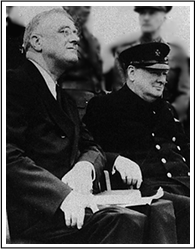 The fact that Roosevelt, Churchill, and Stalin managed to hold the
alliance of the United States, Britain, and the USSR together – by
opening a second front in North Africa, then Italy, then D-Day – meant
that by 1943 “about two-thirds of the world’s approximately
nineteen million Jews had been spared the death the Germans intended
for the ‘extinct race’ about which they were assembling artifacts
for a museum in Prague.” This is the conclusion of the eminent
historian Gerhard L. Weinberg, himself a Jewish refugee from Hitler’s
Germany. Hitler’s biographer Ian Kershaw agrees. “World Jewry,” including
American Jews, were “on the verge of a historic downfall,” in
Hitler’s worldview. Roosevelt’s attack on Nazism saved Palestinian
Jewry, saved the future State of Israel, and saved twelve million Jews
worldwide.
The fact that Roosevelt, Churchill, and Stalin managed to hold the
alliance of the United States, Britain, and the USSR together – by
opening a second front in North Africa, then Italy, then D-Day – meant
that by 1943 “about two-thirds of the world’s approximately
nineteen million Jews had been spared the death the Germans intended
for the ‘extinct race’ about which they were assembling artifacts
for a museum in Prague.” This is the conclusion of the eminent
historian Gerhard L. Weinberg, himself a Jewish refugee from Hitler’s
Germany. Hitler’s biographer Ian Kershaw agrees. “World Jewry,” including
American Jews, were “on the verge of a historic downfall,” in
Hitler’s worldview. Roosevelt’s attack on Nazism saved Palestinian
Jewry, saved the future State of Israel, and saved twelve million Jews
worldwide.
I was surprised to learn that few in the United States prior to Pearl Harbor saw the vital importance of defeating Hitler or the enormity of the task. Roosevelt’s foresight, one New Dealer wrote, was superior to the country’s best minds and “this foresight saved us all.” Pierre van Paassen, a journalist, wrote in 1943: “President Roosevelt was one who early grasped the stupendous magnitude and significance of the plot.” When Britain stood alone, Roosevelt’s quiet support sustained Churchill. Joachim von Ribbentrop told Japanese Foreign Minister Yosuke Matsuoka in March 1940 that the British “would long since have abandoned the war if Roosevelt had not always given Churchill new hope.”
My purpose in writing this book is to describe the events of the 1930s and 1940s so that the reader may comprehend, as FDR’s contemporaries did, the realities and limitations the president faced in his war to the death with Hitler. Saving the Jews: Franklin D. Roosevelt and the Holocaust is an attempt to understand the Nazi persecution of the Jews and the Holocaust from Franklin Roosevelt’s and America’s perspective, including that of America’s Jewish leadership. As with most history, we know much more today than FDR knew at the time. How did the events of 1933 to 1945 appear to Franklin Roosevelt? What did he know? When did he know it? What did he do with his knowledge? And how do we evaluate what FDR did or what he failed to do? These are questions I have endeavored to answer.
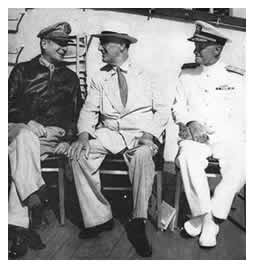 I have written this book for the general reader as well as historians
and have put the Holocaust into the context of the history of the Roosevelt
administration, the Great Depression, and World War II. This, I believe,
is critical to a genuine understanding of the Holocaust, because that
event – as horrible as it was – did not occur in a vacuum.
For example, it is important for the reader to know that the SS St.
Louis sailed from Hamburg, Germany, in May 1939 before World War
II or the Final Solution had begun and before the Auschwitz extermination
camp was constructed. Surprising as it may seem to us today, Anne Frank’s
family was living openly in Nazi-occupied Amsterdam as late as June 1942.
Much of the misunderstanding about Franklin Roosevelt’s role in
the Holocaust is the result of historians’ descriptions of the
Holocaust without reference to other crucial events taking place at the
time. For example, the bombing of Auschwitz could only have been accomplished
from May to November 1944, a brief time period that coincided exactly
with D-Day, the Normandy invasion, and the Allies’ push to Berlin.
I have written this book for the general reader as well as historians
and have put the Holocaust into the context of the history of the Roosevelt
administration, the Great Depression, and World War II. This, I believe,
is critical to a genuine understanding of the Holocaust, because that
event – as horrible as it was – did not occur in a vacuum.
For example, it is important for the reader to know that the SS St.
Louis sailed from Hamburg, Germany, in May 1939 before World War
II or the Final Solution had begun and before the Auschwitz extermination
camp was constructed. Surprising as it may seem to us today, Anne Frank’s
family was living openly in Nazi-occupied Amsterdam as late as June 1942.
Much of the misunderstanding about Franklin Roosevelt’s role in
the Holocaust is the result of historians’ descriptions of the
Holocaust without reference to other crucial events taking place at the
time. For example, the bombing of Auschwitz could only have been accomplished
from May to November 1944, a brief time period that coincided exactly
with D-Day, the Normandy invasion, and the Allies’ push to Berlin.
One final note. There is an old saying that he who is able to read tomorrow’s newspaper today can rule the world. A German Jewish refugee from Nazi Germany said of the Holocaust, “Hinterher ist es leicht, weise zu erscheinan” (In hindsight, it is easy to appear wise). A common fallacy, and one most of Roosevelt’s critics are guilty of, is the “historian’s fallacy.” It consists in the failure of historians to keep in mind that their subjects did not know how their stories ended. “Imagine a letter written in France, on May 24, 1337,” David Hackett Fischer wrote in Historians’ Fallacies (1970) “which announced ‘the Hundred Years’ War began here today.”
We will follow Hitler’s rise to power and his campaign to humiliate, impoverish, and finally exterminate the Jews of Europe, as Franklin Roosevelt saw it, not knowing, unlike his critics today, how events would unfold and not knowing, as we do now, about the Holocaust, and not knowing if the battle with Hitler and his henchmen would become a Hundred Years’ War, and most of all, not knowing that the Allied nations would win.
Robert N. Rosen
April 2006
/ “Only one group,” Burns and Dunn wrote, “revealed no class cleavage. Rich or poor, Jews voted Roosevelt” (The Three Roosevelts, 335; Newton, ed., FDR and the Holocaust, 55; Johnson, A History of the Jews, 504). Johnson relied on David Wyman, The Abandonment of the Jews, for this opinion. See footnote 182, 625. Rabbi Haskel Lookstein accused Roosevelt of being antisemitic in Were We Our Brothers’ Keepers, 79 (“American Jews could not have known what Roosevelt felt then”), 285. The index read: “Roosevelt, anti-Semitic remarks of.” Robert S. Wistrich claimed Roosevelt “was not immune to a ‘liberal’ version of anti-Semitism,” in Hitler and the Holocaust. Joseph E. Persico, an author friendly to FDR, wrote in Roosevelt’s Secret War, 217-20, that FDR “had been shaped in some decree by the genteel prejudices of his class.”
/ “Abandonment of the Jews” was a phrase used in Arthur Morse’s popular polemic While Six Million Died: A Chronicle of American Apathy, picked up and used by David S. Wyman’s scholarly version of the same basic argument, The Abandonment of the Jews: America and the Holocaust, 1941-1945; “indifference” and “complicity” from Henry L. Feingold, The Politics of Rescue: The Roosevelt Administration and the Holocaust, 1938-1945, x, 166, 299, 300; “endangered European Jews,” Rafael Medoff, The Deafening Silence, 181; “prevented” rescue, Herbert Druks, The Failure to Rescue, 98; “accomplices” in Monty Penkower, The Jews Were Expendable: Free World Diplomacy and the Holocaust, vii. Riegner quoted in Riegner, “The Allies and Auschwitz,” 77. Saul Friedman, No Haven for the Oppressed: United States Policy Toward Jewish Refugees 1938-1945, 7, 14, 231-34.
Feingold is considered to be the most reasonable of Roosevelt’s many critics among academic historians, but he appeared to detest FDR. “What emerges from the growing record is that the President, so beloved by American Jewry, did not have the spiritual depth to fathom the crucible being experienced by European Jewry, the historical insight and intelligence to understand the meaning of Auschwitz for our time, or the political courage to bring his Administration to a more active rescue policy. It was at once a failure of mind, spirit, and will.” Feingold, “The Government Response” (252), in The Holocaust: Ideology, Bureaucracy, and Genocide, the San José Papers.
David Wyman is, by far, the most prodigious and indefatigable researcher in this field. He spent fifteen difficult and emotional years researching and writing Abandonment of the Jews, and his attention to detail and knowledge of the facts are recognized and appreciated by both his many admirers and his many critics.
For a summary of the historiography see Frank W. Brecher, “‘The Western Allies and the Holocaust,’ David Wyman and the Historiography of America’s Response to the Holocaust: Counter-Considerations,” 423-46.
Many historians, of course, did not agree with the Roosevelt critics. I have relied on the work of many distinguished historians, including, most notably, Lucy S. Dawidowicz, author of The War against the Jews and other works on the Holocaust; Gerhard L. Weinberg, author of A World at Arms: A Global History of World War II and other works on World War II; Richard Breitman and Alan Kraut, American Refugee Policy and European Jewry, 1933-1945; Breitman, Official Secrets: What the Nazis Planned, What the British and Americans Knew; William D. Rubinstein, The Myth of Rescue; and Peter Novick, The Holocaust in American Life. I have also benefited from the excellent work of William J. Vanden Heuvel (see “America and the Holocaust,” American Heritage Magazine, July/August 1999, vol. 50, no. 4, 34-51).
/ Urofsky, A Voice That Spoke for Justice, chap. 22. “How could [Wise] pledge secrecy when millions of lives were involved?” Elie Wiesel complained (319). Saul Friedman accused Wise of being “docile” and “silent” (320). Wyman, The Abandonment of the Jews, 54, 69-70; Bauer, Jews for Sale?, 258-59; Medoff, The Deafening Silence; Lookstein, Were We Our Brothers’ Keepers?, 79.
/ On the number killed in World War II: Lucy S. Dawidowicz, The Holocaust and the Historians, chap. 1 (“at least 35 million persons, perhaps even as many as 50 million”). The exact number of victims is unknowable. Gilbert, The Second World War, 1 (“More than forty-six million”); Keegan, The Second World War, chap. 33 (50 million); Dower, War Without Mercy, 3 (“over fifty million”); Reader’s Digest’s The World at War, 1939-1945, put the total at 75 to 100 million (Soviet Union: 27 million; Germany: 7 million, including massacred ethnic Germans; China: 20 million; Poland: 6 million; Yugoslavia: 1.7 million; the Indians of Burma: 1 million), 139. The Germans murdered 5 million to 6 million Jews (The Holocaust Encyclopedia, xiv). According to Dower in War without Mercy, the Soviet Union lost 20 million people or more, counting combatants and civilians. Chinese losses are unknown, but range from several million to 15 million deaths. “A United Nations report in 1947 estimated that 9 million Chinese were killed in the war, and “an enormous number died of starvation or disease in 1945 and 1946" as a result of the Japanese war. “Certainly, it is reasonable to think in general terms of approximately 10 million Chinese war dead, a total surpassed only by the Soviet Union,” Dower concluded (295-96). According to Daniel Barenblatt in A Plague upon Humanity, fn. #20, at least 580,000 people were killed by the Japanese using germ warfare and human experiments. Total Japanese deaths were more than 2,100,000, of which 1,740,955 were military and 360,000 were civilians (50,000 to 80,000 at Hiroshima alone), 298; Weinberg, A World at Arms, 889. Arno J. Mayer estimated 42 million killed in World War II and that more than 3 million Soviet officers and men were murdered by the Nazis. The bulk of Europe’s 18 million civilian war dead were Russian and Polish Christians. Mayer, Why Did the Heavens Not Darken?, 13, 201.
/ New York Times, December 18, 1942, 10;Gilbert, Auschwitz and the Allies, chap. 11.
/ Gilbert, The Second World War, 426; Kershaw, Hitler 1936-45, 516-17; Weinberg, A World at Arms, 250-52; Breitman, Architect of Genocide, 63; Casey, Cautious Crusade, 9; Kimball, The Juggler, 12, 15-16 (the “almost unanimous military opinion [was] that the Red Army would be defeated and Soviet resistance would collapse”); Frye, Nazi Germany, chap. 11 and 12 (Professor Frye quoted Guenter Moltmann that Roosevelt’s “place in history is best measured by his correct appraisal of Hitler’s global ambitions” (fn. 31, 185). Professor Weinberg has described Hitler’s vision of murdering Jews all over the world in “The Allies and the Holocaust,” in The Holocaust and History: The Known, the Unknown, the Disputed, and the Re-examined (as Hitler “explained to the Grand Mufti of Jerusalem, the Jews not only of Europe but everywhere else were to be killed.” 484); and Weinberg, Germany, Hitler, and World War II, 218 (“As Germany reached for global domination, it acquired control over the fate of a steadily increasing number of Jews”); 219 (“had Germany won [the] war, as its leaders confidently expected, their extension of the killing to the rest of the globe would obviously have increased”) Eleven million, not six million, see Gilbert, Holocaust, 245, 280-84; Bauer, American Jewry and the Holocaust, chap. 20 (“Jewish power had to be destroyed globally – presumably by mass murder,” 454). McKale, Hitler’s Shadow War, 2-5. The Nazis were well aware that American Jewry was its mortal enemy. Jews were not allowed to immigrate to the United States after October 1940 because it would lead to a “renewal” of Jewry in the United States, which would allow American Jewry “to create a new platform from which it contemplates to continue its battle most forcibly against Germany.” Gilbert, Holocaust, 131. Stürmer quote, Dwork and Van Pelt, Holocaust, 259.
/ Weinberg, Germany, Hitler, and World War II, 243; McKale, Hitler’s Shadow War, 238-40 (Hitler spoke of “exterminating” “the Jew” in general, not just in Europe). My figure of 12 million Jews saved from the Holocaust is based on Weinberg’s figures. Raul Hilberg puts the total number of Jews at 16 million, not 19 million: 7 million within and 9 million outside the Nazi sphere (more than 2 million in the USSR not occupied by Germany, 5 million in the United States, 300,000 in Britain and 400,000 in Palestine). (Perpetrators, Victims, Bystanders, 225). The Historical Atlas of the Holocaust published by the United States Holocaust Memorial Museum puts the total number of Jews at 15.3 million, of whom 9.5 million were in Europe in 1933 (3,000,000 in Poland; 2,525,000 in the European USSR; 980,000 in Romania). (13-14); Mayer, Why Did the Heavens Not Darken?, 304; Kershaw, Hitler 1936-45, 589.
/ Donald Nelson quoted in Lash, Roosevelt and Churchill, 167, 329; Goodwin, No Ordinary Time; Kimball, The Juggler, 12-16. Wheeler-Bennett, ed., Action This Day, 205; Cohen, Churchill and the Jews, 188. Van Paassen, The Forgotten Ally, 184; Frye, Nazi Germany, chap. 12.